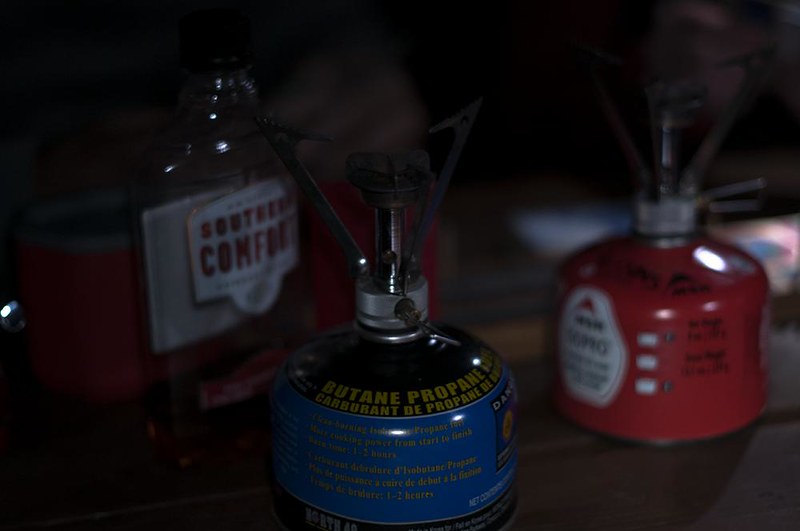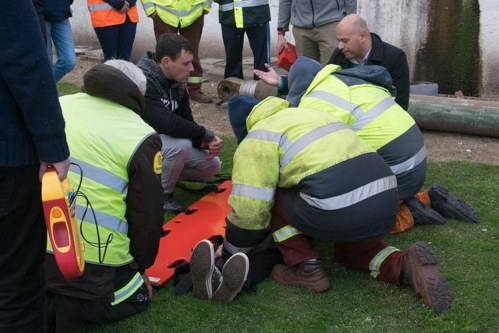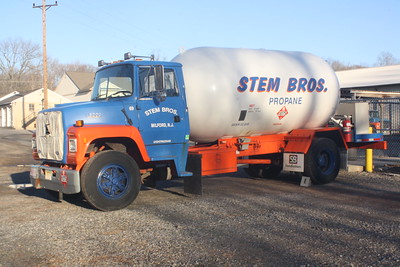
Have you wondered if you can you use propane instead of butane? We are going to answer that in this article and we’ll give you some information.
Propane and butane are both types of hydrocarbons that are commonly used as fuel. However, they have some differences that make them suitable for different applications.
Propane is a type of liquefied petroleum gas (LPG) that is stored and transported as a liquid. It has a higher vapor pressure than butane, which means that it can be used in a wider range of temperatures. Propane is also less dense than butane, so it takes up more space in its liquid form. These properties make propane a good choice for use in outdoor appliances, such as barbecues and portable heaters, because it can vaporize and burn more easily in cold temperatures.
Butane, on the other hand, is a hydrocarbon with a lower vapor pressure than propane. It is stored and transported as a liquid, but it vaporizes and burns more easily at higher temperatures. This makes it a good choice for use in lighters and other indoor appliances that operate at higher temperatures.
In general, it is not recommended to use propane in place of butane or vice versa, as each fuel has its own specific properties and characteristics that make it suited for certain applications. Using the wrong type of fuel can result in poor performance or even safety hazards. If you are not sure what type of fuel to use, you should consult the manufacturer’s instructions or the owner’s manual for your appliance..
What is propane?
Propane is an organic compound with the chemical formula C3H8, normally a gas, but compressible to a transportable liquid. A by-product of natural gas processing and petroleum refining, it is commonly used as a fuel for engines, barbecues, portable stoves and residential central heating. Propane is one of a group of liquefied petroleum gases (LP gases). The others include butane, propylene, butylene, and mixtures thereof.
Its applications are:
- Heating: Propane is a popular fuel for heating homes and buildings, particularly in areas where natural gas is not available. It is also used to heat water in some homes.
- Cooking: Propane is used as a fuel for cooking in both residential and commercial settings. It is commonly used for outdoor grilling and in portable stoves.
- Drying clothes: Propane is used as a fuel for some clothes dryers, particularly in areas where natural gas is not available.
- Generating electricity: Propane is sometimes used as a fuel for generating electricity in remote locations or in emergency situations.
- Transportation: Propane is used as a fuel for some vehicles, such as buses and forklifts.
- Recreational vehicles: Propane is used as a fuel for heating and cooking in recreational vehicles, such as RVs and campers.
- Industrial processes: Propane is used as a fuel in a variety of industrial processes, such as the production of steel and concrete.
What is butane?
Butane is a gas at room temperature and pressure. It is easily liquefied due to its low boiling point of −0.5 °C and therefore it is often used as a fuel for lighters and as a propellant in aerosol spray cans. Butane is also used as a feedstock for the production of methyl tert-butyl ether (MTBE), used as an additive in petrol. Some strict regulations apply when using butane in some applications.
Its applications are:
- Lighter fuel: Butane is often used as a fuel for lighters, particularly cigarette lighters.
- Gas grills: Butane is used as a fuel for gas grills and portable stoves.
- Recreational vehicles: Butane is used as a fuel for heating and cooking in recreational vehicles, such as RVs and campers.
- Solvent: Butane is used as a solvent in the production of some products, such as adhesives and cleaning agents.
- Aerosol propellant: Butane is used as a propellant in the production of aerosol products, such as spray paint and hair spray.
- Refrigerant: Butane is used as a refrigerant in some refrigeration systems, particularly in portable cooling units.
- Fuel blending: Butane is sometimes added to gasoline as a fuel blending agent to increase the fuel’s octane rating and improve its performance.
What are the similarities between propane and butane?
Propane and butane are both gaseous hydrocarbon compounds. They are both colorless, odorless, and flammable. Both propane and butane are used as fuel for heating, cooking, and other industrial applications.
Propane is a heavier gas than butane, and thus Propane will sink in air while butane will rise. Propane has a boiling point of -42 degrees Celsius while butane’s boiling point is -2 degrees Celsius. This means that propane can be liquefied at higher pressures than butane.
Propane is primarily used as a fuel for heating, cooking, and powering vehicles, while butane is primarily used as a fuel for lighters and portable stoves.
Physical Properties and Performance Factors
| Property/Performance Factor | Propane | Butane |
|---|---|---|
| Gas State at Room Temperature | Propane remains a gas at room temperature and atmospheric pressure, making it easy to compress and transport as a liquefied petroleum gas (LPG). | Butane also remains a gas at room temperature but liquifies at a slightly higher temperature than propane, requiring less pressure for liquefaction. |
| Storage Requirements | Requires a robust cylinder that can withstand higher pressures, especially in warmer climates since its boiling point is -42°C. | Can be stored in lighter containers due to its boiling point of -2°C, which is higher than propane, meaning it remains liquid at a lower pressure. |
| Safety Considerations | Higher pressure storage increases the risk of explosion if the container is improperly handled or damaged. It is heavier than air, so it can accumulate at ground level, posing a risk of ignition. | Lower pressure storage is generally safer, but it is also heavier than air and can pool in low areas, leading to similar risks of explosion if not properly ventilated. |
| Efficiency in Combustion | Burns hotter than butane, making it more efficient in terms of heat generation and is preferred in colder environments or for outdoor cooking. | Produces less heat on combustion compared to propane, making it less suitable for cold climates but can be more efficient for indoor applications where lower temperatures are required. |
Practical Applications and Compatibility
| Practical Applications and Compatibility | Butane | Propane |
|---|---|---|
| Appliances Commonly Using Butane |
|
|
| Propane as an Alternative: Potential Adjustments |
|
|
| Comparison of Cost-effectiveness | Typically less expensive per unit, but may be less cost-effective in colder environments due to lower calorific value. | Generally more expensive per unit, but higher efficiency and heat output can make it more cost-effective, especially in cooler climates or for bulk storage. |
Difference between propane and butane regulator
There are several key differences between propane and butane regulators that consumers should be aware of before making a purchase. Propane regulators are designed to regulate the pressure of propane gas in a tank, while butane regulators are designed to regulate the pressure of butane gas in a canister. Propane regulators typically have a higher maximum pressure rating than butane regulators, making them more suitable for regulating high-pressure propane gas tanks. Butane regulators also tend to be less expensive than propane regulators.
When it comes to choosing a propane or butane regulator, there are a few key differences to keep in mind. Propane regulators are typically used for larger tanks, while butane regulators are better suited for smaller portable tanks. Butane is also a more volatile gas, so it requires a higher pressure regulator than propane.
Propane regulators are available in both low and high-pressure varieties. Low-pressure propane regulators are typically used for home applications, such as space heaters, fireplaces, and BBQ grills. High-pressure propane regulators are typically used for commercial applications, such as forklifts and industrial heaters.
Butane regulators are only available in high-pressure varieties. This is because butane is a more volatile gas than propane and requires a higher pressure regulator to control the flow of gas. Butane regulators are typically used for portable heaters, camping stoves, and portable grills.
Can You Use Propane in a Butane Stove?
Can You Use Propane in a Butane Stove? No, you can’t. Propane and butane are two different types of fuel, and they’re not interchangeable.
Here’s a quick rundown on the differences between propane and butane: Propane is a heavier gas than butane, so it doesn’t vaporize as easily. That means that if you tried to use propane in a butane stove, the stove wouldn’t work very well (if at all). Butane is a lighter gas than propane, so it vaporizes more easily. That means that it’s better suited for use in a butane stove.
So, to answer the question: no, you can’t use propane in a butane stove. If you try to, you’ll probably just end up with a stove that doesn’t work very well (if at all).
Propane and butane are both gases that are used for heating and cooking. While they are similar, they are not the same, and you cannot use propane in a butane stove.
Propane is a heavier gas than butane, so it will not vaporize as easily. This means that it will not work well in a butane stove, which is designed for a lighter gas. In addition, propane is pressurized, while butane is not. This means that there is a risk of explosion if you try to use propane in a butane stove.
So, can you use propane in a butane stove? No, you cannot. It’s not safe and it won’t work properly. If you need to use one of these gases for cooking or heating, make sure you get the right stove for the job.
Can You Use Propane in a Butane Stove?
As you may know, propane and butane are two different types of gas. Propane is a type of petroleum gas, while butane is a type of natural gas. They are not interchangeable. While you can use propane in a butane stove, it is not recommended. The two gases have different properties and burning characteristics. Propane is a much hotter burning gas than butane. This can cause problems with the stove’s internal parts, as well as create a safety hazard. If you do use propane in a butane stove, be sure to closely monitor the stove and keep a fire extinguisher nearby.
The two types of fuel, propane and butane, are not interchangeable. Propane is a commonly used fuel for camping stoves, lanterns, and other portable appliances. Butane is often used as a fuel for cigarette lighters and portable gas heaters. While it is possible to use butane in a stove designed for propane, it is not recommended. The two fuels have different burning characteristics, and using butane in a stove designed for propane can be dangerous.
What are some tips for using propane and butane in portable stoves?
Propane and butane are both common fuels for portable stoves. While they are similar, there are some important differences to keep in mind when using them.
Propane is a heavier gas than butane, so it will take longer to heat up your stove. This means that you’ll need to be patient when cooking with propane. Butane is also a more volatile gas, so it can be harder to control the flame.
When using a portable stove, it’s important to make sure that the area around the stove is well ventilated. This will help prevent the build-up of dangerous gases. You should also have a fire extinguisher on hand in case of an accident.
Here are some general tips for using propane and butane in portable stoves:
- Preheat the stove before adding food.
- Use a lower flame when cooking with propane.
- Be patient when cooking with propane – it will take longer to heat up than butane.
- Make sure the area around the stove is well ventilated.
- Have a fire extinguisher on hand in case of an accident.
Butane is much safer than propane for indoor usage
When it comes to using gas for indoor heating, most people automatically think of propane. However, butane is actually a much safer option for indoor usage. Here’s why: Butane is odorless, so you’ll never have to worry about it leaking and causing an explosion. Propane, on the other hand, has a strong odor that can be easily detected if there’s a leak.
Butane is also non-toxic, so it won’t cause any health problems if it’s accidentally inhaled. Propane, on the other hand, is toxic and can cause serious health problems if inhaled. Butane is also much less flammable than propane. This means that it’s much less likely to cause a fire if there’s a leak.
When it comes to indoor usage, butane is much safer than propane. This is because butane is not as volatile as propane and is therefore less likely to cause an explosion. Propane is also more likely to leak than butane, which can be a major safety hazard.
So, if you’re looking for a safe and effective gas for indoor heating, butane is the way to go.
Can You Switch/Convert?
| Advantages and Disadvantages of Switching | Pros of Using Propane Over Butane | Cons of Using Propane Over Butane |
|---|---|---|
| Availability and Accessibility | Propane is more widely available and accessible in many regions, especially rural areas. | Switching may limit access to butane-specific supply chains and refilling infrastructures. |
| Cold-Weather Performance | Propane performs better in cold weather due to its lower boiling point, making it reliable in a broader range of temperatures. | Butane can become ineffective in cold temperatures, necessitating the switch to propane for consistent performance. |
| Storage and Transport | Propane can be stored in larger quantities and is less likely to require frequent refilling due to its higher energy content. | Storage and transport solutions for butane may not be adequate for propane without significant adjustments due to different pressure requirements. |
| Equipment Modifications Required | Existing equipment may require minimal modifications to switch from butane to propane. | Switching to propane often requires changing regulators, nozzles, and other components, which can be costly and time-consuming. |
| Safety Risks in Unadjusted Settings | Propane’s properties are well understood and can be safely managed with proper equipment and handling. | Using propane in butane-designed systems without proper adjustments can increase safety risks due to higher pressure and density. |
| Economic Implications | While the unit cost may be higher, propane’s efficiency and lower operational costs can offset the initial investment over time. | The transition to propane might entail upfront costs for equipment, infrastructure modifications, and learning curves for handling the new fuel. |
When considering the switch from butane to propane, safety is paramount. The following guidelines can help ensure a safe conversion:
A. Professional Assessment for Conversion:
- Consult with Qualified Technicians: Before conversion, it’s essential to have a professional assess the current system to identify what modifications are necessary for using propane safely.
- Safety Inspection: A thorough safety inspection should be conducted on all existing butane appliances and storage systems to determine their compatibility with propane.
- Pressure Assessment: Given that propane operates at a higher pressure, a detailed pressure test is needed to ensure that the current system can handle the changes without risk of leaks or ruptures.
B. Necessary Modifications in Appliances and Storage:
- Regulator Upgrade: Replace the butane regulator with one that is designed for the higher pressure of propane.
- Nozzle/Burner Adjustment: Modify or replace the nozzles/burners to accommodate the different combustion characteristics of propane.
- Storage Cylinders: Upgrade to storage cylinders that are rated for the higher pressure of propane, including proper safety valves.
- Ventilation: Enhance ventilation systems as needed to meet the requirements for propane use, particularly in enclosed spaces.
- Leak Detection Systems: Install or upgrade leak detection systems to quickly identify any propane leaks due to its higher volatility.
C. Regulatory and Compliance Considerations:
- Local Codes and Regulations: Review and comply with all local building codes, fire codes, and regulations regarding the storage and use of propane.
- Permits: Obtain any necessary permits for the storage of propane or the operation of propane-fueled equipment.
- Standards Compliance: Ensure that all modifications and equipment meet national and international standards such as those set by the National Fire Protection Association (NFPA) or the International Code Council (ICC).
- Certification: After modifications, have the system re-certified for safety by a qualified professional to ensure it meets all regulatory requirements.
- Record-Keeping: Keep detailed records of all inspections, modifications, and compliance measures in case of audits or insurance inquiries.
By following these guidelines, users can make a safe transition from butane to propane, ensuring that the new system operates efficiently and safely while meeting all legal requirements.
Countries/Regions Where Propane is Preferred Over Butane:
- United States: Propane is widely used across the US for heating, cooking, and fueling vehicles, particularly in rural areas where natural gas pipelines may not be available.
- Canada: Given its colder climate, propane is the preferred choice for heating due to its lower boiling point, which allows it to vaporize and be used as a gas in low-temperature conditions.
- Scandinavian Countries: Similar to Canada, the cold climates of countries like Norway and Sweden make propane a better option for heating purposes.
- Australia: In remote areas of Australia, propane is commonly used for heating and cooking due to its easier transport and storage in comparison to butane.
Situations Where Propane Can Serve as a Direct Substitute
- Outdoor Cooking: Propane is an effective substitute for butane in outdoor cooking appliances like barbecue grills due to its better performance in windy and cold conditions.
- Portable Heaters: For outdoor heating, such as patio heaters, propane is often used in place of butane because it is more effective in colder temperatures.
- Motor Vehicles: Propane is used as an alternative to butane in vehicles, particularly in liquid petroleum gas (LPG) powered vehicles due to its availability and better combustion properties.
Examples of Adjustments Made in the Switch from Butane to Propane
- Regulator Changes: For appliances that can use both gases, such as a camping stove, switching from butane to propane typically requires changing the regulator to accommodate the higher pressure of propane.
- Nozzle Adjustments: The orifice size for propane is different due to its higher pressure; therefore, nozzles or jets within burners often need to be replaced or adjusted.
- Safety Measures: When switching to propane in an indoor environment, such as for a kitchen stove, additional ventilation may be needed to account for the heavier nature of propane, which can pool on the floor if leaked.
- Storage Revisions: Propane requires more robust and pressure-resistant storage tanks compared to butane. Facilities switching to propane need to invest in appropriate storage solutions.
- Training for Handling: Due to the higher pressure and volatility, personnel may require training to safely handle and connect propane tanks, especially in commercial or industrial settings.
Each of these case studies and scenarios underscores the importance of understanding the characteristics and requirements of propane compared to butane to ensure safe and efficient use when considering a switch.
To Make a Conclusion
There are a number of reasons why you might want to use propane instead of butane. Propane is a more energy-dense fuel than butane, meaning that a given volume of propane will contain more energy than an equivalent volume of butane. This means that you’ll get more heat out of a given amount of propane, making it a more efficient fuel to use.
Additionally, propane burns hotter than butane, so it can be a good choice if you need to generate a lot of heat quickly. Finally, propane is less likely than butane to freeze up in cold weather, making it a better choice for use in portable stoves in winter conditions.
The question for “Can I Use Propane Instead of Butane?”. We hope we enlighten you about this matter.

Mike is an experienced propane technician with over 15 years of professional experience in the field. He has dedicated his career to helping customers with their propane needs, from installation to maintenance and repair. Together with Jeremy, he co-founded this website to provide useful information and guidance to customers seeking reliable propane services.



